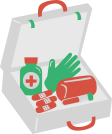You’re not alone in your journey. Let’s navigate the challenges together, find hope, and build unstoppable strength.
Emma, USA
If you or your loved one have been diagnosed with Leigh syndrome within the past 6 months, we want to extend our support to your family by offering a care package. This opportunity is currently available to US families only.
Checklist for the newly diagnosed

Milo, USA

Kshiti, USA
Preparing for a Doctor's Appointment

Get all logistical questions answered ahead of time. This includes knowing who you will be seeing, the duration of the appointment, whether any records need to be sent beforehand, as well as parking and other information.

Consider bringing a friend or a family member with you if that would be a source of support.

Make a list of questions to bring with you. Some families find it helpful to keep a running list of questions between appointments and write down questions as they come up.

Know that while the doctor is there to provide their knowledge, information, and recommendations, you are the one making all final decisions regarding yours or your child’s care.

Speak up if you need clarifications on anything the doctor is explaining or if the information feels too overwhelming and you need time to pause and absorb it. Although speaking up may seem difficult, it will help you understand the information better and build a stronger partnership with your doctor and medical team.

Ask how to follow up, what is the expected response time, and who will answer your questions (doctor, nurse, other).
Parental Well-Being Guide
Foundational ideas:
- In order to be a calm, robust leader for their families, parents need to prioritize time to care for their own physical and emotional needs.
- If parents can take a small action every day to support their own well-being, this supports the psychological and emotional health of the whole family.
Pay attention to physical and
mental health basics:
- Adequate sleep
- Good nutrition
- Hydration
- Exercise
- Connection with people who care
about you - Time away from screens
Use cognitive strategies – develop a few scripts for managing difficult moments:
- “This is stressful but I’m not alone. I can tell _____ about it soon.”
- “I’m a good parent having a hard time. I’m going to try my best.”
- “I’m going to take 5 slow, deep breaths and then re-evaluate.”
- “This is an intense moment. I’m going to close my eyes and count to 20 so I can re-set.”
Consider which positive coping strategies worked best for you prior to getting your child’s diagnosis:
- Mindfulness, meditation, yoga
- Gardening
- Exercise – walk, dance, run, bike, swim
- Connect with friends or family – in person or virtually
- Read…or listen to an audiobook or podcast
- Take a bath or shower
- Play music or listen to a favorite play list
- Write, draw, or craft
- Therapy or parent coaching
Identify quick, 5-10 minute coping options that can serve as a daily well-being snack:
- Take a short walk
- Read one poem
- Play a quick game on your phone, such as Wordle
- Text a friend: “I have 5 minutes, are you free to say hi?”
- Use a meditation app (such as Calm, Headspace, or 10% Happier) for a 3 minute meditation
- Take a few slow, deep breaths
- Listen to one favorite song
- Ask a friend or family member to send you a silly meme or cartoon a couple of times a week (often a good job for a teen or young adult relative)
Mindfully manage your social media:
- Be thoughtful about the pros and cons of your social media diet
- Consider whether you generally feel better or worse after you spend time on a particular app
- Consider setting a daily time limit on some apps
Author: Rachel Kramer, PhD
More Support Resources
General
- Shop products recommended by our families in our Amazon Storefront
- When a child may use a ventilator for a long time – information and support
- Cure Mito Facebook group for Leigh syndrome patients and caregivers
- Courageous Parents Network
- Guidebook for Caregivers of Children with Rare and/or Serious Illness
- Making Informed and Shared Decisions About Genetic Testing and Clinical Trial Participation
- Yellow Pages for Kids with Disabilities
- Child Neurologist New Visit Toolkit
- Rare Siblings Project
- Article: Grief for beginners: 5 things to know about processing loss
Financial Support
- Kids Medicaid Waivers
- Make a Wish
- Supplemental Security Income (SSI)
- My Gym Foundation
- Patient assistance programs that help pay for medications
Podcasts
Books for Kids
Books for Adults
- Everything No One Tells You About Parenting a Disabled Child: Your Guide to the Essential Systems, Services, and Supports
- Breath Taking: A Memoir of Family, Dreams, and Broken Genes
- Normal Broken: The Grief Companion for When It’s Time to Heal but You’re Not Sure You Want To
- Soundtrack of Silence: Love, Loss, and a Playlist for Life
- Bump In The Road: 15 Stories of Courage, Hope and Resilience with Serious Illnesses
- Shared Struggles: Stories from Parents and Pediatricians Caring for Children with Serious Illnesses
- Butterflies and Second Chances: A Mom’s Memoir of Love and Loss
- The Still Point of the Turning World
- Peach: Celebrating Life in the Shadow of Death
- Letters to Jacob: Grieving the Loss of a Child
- You Are Not Alone: An Encouraging Coloring Book for Mothers and Caregivers of Children with Special Needs
- Chasing My Cure: A Doctor’s Race to Turn Hope into Action
- One in a Billion: The Story of Nic Volker and the Dawn of Genomic Medicine
- In Shock (My Journey from Death to Recovery and the Redemptive Power of Hope)
- Permission to Mourn: A New Way to Do Grief
- Man’s Search for Meaning
- Option B: Facing Adversity, Building Resilience, and Finding Joy

Download this resource
Download these support resources to help guide you on your journey with mitochondrial disease. We hope they help provide valuable information and guidance.

Join Us and Be in the Know
Stay informed and never miss an update by subscribing to our newsletter. Join our community today to receive monthly news, updates, and insights.
We thank the authors and contributors who helped with the development of this page: Kasey Woleben, Sophia Zilber, Courtney Boggs, Shamima Rahman, FRCP, FRCPCH, PhD, Ibrahim Elsharkawi, MD, Breanna Lima Martinez, MS, CGC, Melinda J. Burnworth, PharmD, BCPS, FASHP, FAzPA, Titilola M. Afolabi, PharmD, BCPPS, Peter McGuire, MD, Krisztina Ferencz, Rachel Kramer, PhD.



